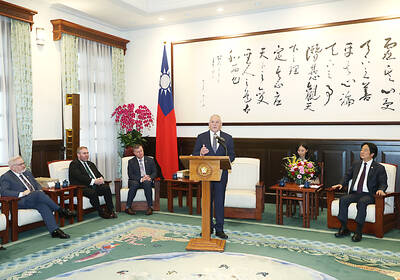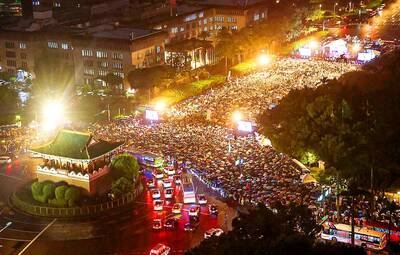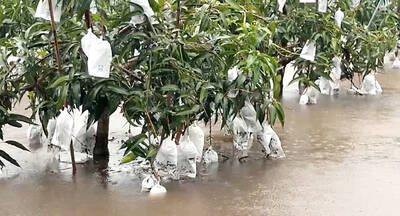Described by his many friends as a man who knows nothing but politics, former vice premier Chiou I-jen (邱義仁) made a painful decision last week when he offered to leave his “beloved” Democratic Progressive Party (DPP) and retire from politics for good to take responsibility following a diplomatic scandal.
“When I walk out of the Executive Yuan today, I will no longer be involved in politics. Everyone more or less knows how this makes me feel,” Chiou said when asked about his state of mind as he resigned on May 6.
Kaohsiung City Mayor Chen Chu (陳菊), who steered Chiou into politics by encouraging him to campaign for the late dangwai democracy activist Kuo Yu-hsin (郭雨新) in 1975, said: “For Chiou, quitting politics and the DPP is the severest punishment.”
Chiou’s resignation came after a secretive deal involving two shady brokers and US$30 million in funds intended for the establishment of diplomatic relations with Papua New Guinea was botched, resulting in the disappearance of the funds from a Singapore bank account.
Chiou, in his former position as head of the National Security Council (NSC), was the instigator of the deal, which also led former vice minister of national defense Ko Cheng-heng (柯承亨) and former minister of foreign affairs James Huang (黃志芳) to resign in disgrace.
Some opposition lawmakers have alleged that the affair was in reality “a money laundering scheme in the guise of a diplomatic deal” set up by Chiou.
Those accusations were made on the basis of a sequence of mistakes such as Chiou’s failure to request background and reliability checks by security agencies on the two brokers, as well as Huang’s ministry bypassing regular procedures for the appropriation of funds.
“Having middlemen involved in efforts to develop diplomatic ties is unavoidable, but [officials] cannot act on trust alone,” former minister of foreign affairs Chen Chien-jen (程建人) said.
Loh I-cheng (陸以正), a retired diplomat, said he did not understand how the Ministry of Foreign Affairs could have remitted the money to a joint account rather than open an escrow account with all payments contingent on the establishment of relations between the two countries.
“The ministry might just as well have had one of its officials participate in the joint account,” Loh said.
All the irregularities, added to the fact that the country’s highest intelligence agency managed to get fooled by two brokers — whose shady past was no secret — made the story difficult to believe for Chiou’s opponents.
However, Chiou’s DPP allies, who gave him the sobriquet Laba — a Hoklo term meaning “trumpet,” quickly came to his defense.
Chiou earned that nickname during the dangwai era, as what he thought and said about things was always accepted by groups, which underscored his influence in the DPP.
But as Chen Chu said, Chiou’s friends believe the scandal was the result of Chiou’s “mistaken judgment” on the two brokers as well as his arm’s length decision-making style, in which he only oversees things from a general perspective and lets his subordinates work out the details.
“The thing about Chiou Laba, is that he loves power, but he has never shown an interest in money since I have known him,” aid Chen Chun-lin (陳俊麟), vice chairman of the Executive Yuan’s Research, Development and Evaluation Commission.
Chen Chun-lin, a member of the DPP’s disbanded New Tide faction, of which Chiou was a founder, said: “Chiou Laba knows he is smart enough. He has confidence in his capabilities and he wants to hold political power so that he can get things done.”
Chiou’s talent for politics, added to the “philosophy of being second-in-command,” to which he has subscribed throughout his political life, made him the best choice for secretary-general.
Having served as the party’s secretary-general under former chairmen Shih Ming-teh (施明德), Hsu Hsin-liang (�?}) and Lin I-hsiung (林義雄) while the party was in opposition and then as secretary-general for the Cabinet, the Presidential Office and the NSC after the DPP came to power in 2000, Chiou was referred to as a “permanent secretary-general.”
However, Chiou’s shrewdness in politics stood in clear contrast to his incompetence in handling real-life affairs.
Chen Chun-lin said Chiou is like a “retarded child” when it comes to his life.
“[Chiou] eats instant noodles and microwave food when he is at home. He is a half-idiot when it comes to computers, knowing only how to surf the Internet. I believe he doesn’t even know how to send text messages and has no idea about ‘what a joint account is,’” Chen Chun-lin said.
He was refereeing to remarks Chiou made recently while seeking to clarify media reports that he had sent text messages to Ching and ordered Huang to remit the money to the joint account.
“Chiou Laba never pursues material comforts. He just has enough to get by. If he has anything of value, it would probably be his pen collection,” Chen Chun-lin said.
Chen Chun-lin said Chiou spends most of his spare time listening to “Beatles-era rock-and-roll” and watching “old movies,” activities Chiou has regaled in since his student years at National Taiwan University’s department of philosophy.
But when 13 teachers from the department lost their jobs for criticizing the Chinese Nationalist Party (KMT) regime in early 1970s, Chiou switched his graduate-school major to politics.
KMT Legislator John Chiang (蔣孝嚴) said the Papua New Guinea scandal was likely the result of the DPP government’s “continued mistrust of professional diplomats,” referring to diplomatic personnel educated and trained before the DPP came into power.
The fact that the country’s representative office in Singapore was totally excluded from participating in the PNG case, Chiang said, highlighted that distrust.
DPP Department of International Affairs Director Hsiao Bi-khim (蕭美琴) disagreed, saying that “Chiou would not have passed the PNG case to the ministry if such mistrust had existed.”
Hsiao said that “making inquiries about executive details is not Laba’s ways of doing things,” based on which she believed Huang’s ministry had received the appropriate authorizations by Chiou.
“Laba made some mistakes: He trusted [Ching and Wu] too easily. Only a few people were in the loop and he didn’t consult others. But, oftentimes, such behavior is crucial in handling confidential diplomacy,” Hsiao said.
“On a couple of occasions before, we weren’t able to pursue confidential diplomatic projects after news of our efforts had somehow leaked. It’s an unfortunate situation for Taiwan,” Hsiao said, recalling similar cases during her time in the presidential office.
The PNG case has heavily tarnished the image of the DPP, the government and the country, for which Chiou should take responsibility, Hsiao said. But Chiou’s “integrity” is not questioned by people who know him well, even though the whole matter has yet to be cleared up, she said.

‘NON-RED’: Taiwan and Ireland should work together to foster a values-driven, democratic economic system, leveraging their complementary industries, Lai said President William Lai (賴清德) yesterday expressed hopes for closer ties between Taiwan and Ireland, and that both countries could collaborate to create a values-driven, democracy-centered economic system. He made the remarks while meeting with an Irish cross-party parliamentary delegation visiting Taiwan. The delegation, led by John McGuinness, deputy speaker of the Irish house of representatives, known as the Dail, includes Irish lawmakers Malcolm Byrne, Barry Ward, Ken O’Flynn and Teresa Costello. McGuinness, who chairs the Ireland-Taiwan Parliamentary Friendship Association, is a friend of Taiwan, and under his leadership, the association’s influence has grown over the past few years, Lai said. Ireland is

A saleswoman, surnamed Chen (陳), earlier this month was handed an 18-month prison term for embezzling more than 2,000 pairs of shoes while working at a department store in Tainan. The Tainan District Court convicted Chen of embezzlement in a ruling on July 7, sentencing her to prison for illegally profiting NT$7.32 million (US$248,929) at the expense of her employer. Chen was also given the opportunity to reach a financial settlement, but she declined. Chen was responsible for the sales counter of Nike shoes at Tainan’s Shinkong Mitsukoshi Zhongshan branch, where she had been employed since October 2019. She had previously worked

FINAL COUNTDOWN: About 50,000 attended a pro-recall rally yesterday, while the KMT and the TPP plan to rally against the recall votes today Democracy activists, together with arts and education representatives, yesterday organized a motorcade, while thousands gathered on Ketagalan Boulevard in Taipei in the evening in support of tomorrow’s recall votes. Recall votes for 24 Chinese Nationalist Party (KMT) lawmakers and suspended Hsinchu City mayor Ann Kao (高虹安) are to be held tomorrow, while recall votes for seven other KMT lawmakers are scheduled for Aug. 23. The afternoon motorcade was led by the Spring Breeze Culture and Arts Foundation, the Tyzen Hsiao Foundation and the Friends of Lee Teng-hui Association, and was joined by delegates from the Taiwan Statebuilding Party and the Taiwan Solidarity

TRANSPORT DISRUPTION: More than 100 ferry services were suspended due to rough seas and strong winds, and eight domestic flights were canceled, the ministry said Tropical Storm Wipha intensified slightly yesterday as it passed closest to Taiwan, dumping more than 200mm of rain in Hualien and Taitung counties, the Central Weather Administration (CWA) said. As of 11am, Wipha was about 210km southwest of Cape Oluanpi (鵝鑾鼻) and was moving west-northwest at 27km per hour (kph). The storm carried maximum sustained winds of 101kph and gusts reaching 126kph, with a 150km radius of strong winds, CWA data showed. Wipha’s outer rainbands began sweeping across Taiwan early yesterday, delivering steady rainfall in the east and scattered showers in other regions, forecasters said. More heavy rain was expected, especially in the eastern